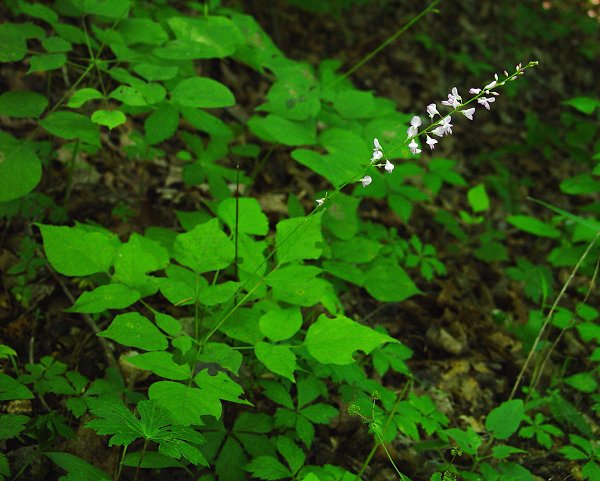Hylodesmum glutinosum (Muhl. ex Willd.) H. Ohashi & R.R. Mill
Cluster Tick Trefoil

Native
CC = 3
CW = 5
MOC = 57
© DETenaglia
Hylodesmum glutinosum (Muhl. ex Willd.) H. Ohashi & R.R. MillCluster Tick Trefoil | |
 |
Native CC = 3 CW = 5 MOC = 57 |
© DETenaglia |
|
Family - Fabaceae/Faboideae Habit - Perennial forb with a short, sometimes woody rootstock, often taprooted. Stems - To 1m tall, herbaceous, pubescent (sometimes sparse), often glaucous, erect, simple, from a tap root.
Leaves - Alternate, trifoliolate, petiolate, stipulate, mostly grouped near middle of stem below inflorescence and giving a whorled appearance. Stipules 9-12mm long, -2mm broad, lanceolate, acute, pubescent. Petioles to +/-20cm long, pubescent, with an adaxial groove. Lateral leaflets on petiolules to 5mm long. Petiolule thick, pubescent. Leaflets oblique at base, ovate, acuminate, to +12cm long, +6cm broad. Terminal leaflet largest, to 15cm long, +9cm broad, ovate, apex acuminate. Petiolule of terminal leaflet to +5cm long. All leaflets pubescent (sometimes sparsely) above and below, entire, with ciliolate margins, often somewhat scabrous.
Inflorescence - Terminal panicles to +40cm long. Axis tomentose. Pedicels to 6mm long in flower, glandular pubescent, often reddish.
Flowers - Papilionaceous. Standard pink, 7mm broad and long, emarginate at apex, glabrous. Keel and wing petals glabrous, pinkish, +6mm long. Stamens monodelphous, 5mm long. Anthers yellow. Style glabrous, white, curved, 2mm long. Ovary 4-5mm long, green, cylindric. Calyx bilabiate, sparse pubescent. Calyx tube to 1mm long. Upper lip shallow, 1-lobed. Lobe to 1.5mm long. Lower lip 3-lobed. Lateral lobes small, acute. Central lobe larger than laterals, acute, 1mm long. Fruit segments typically 3-4, rounded on ventral margin, straight to slightly curved on dorsal surface to +1cm long, +6mm wide, pubescent.
Flowering - June - August. Habitat - Thickets, streambanks, low woods, roadsides, railroads. Origin - Native to the U.S. Lookalikes - Other species of Desmodium and Hylodesmum. Other info. - This is one of the easier species of the Desmodium / Hylodesmum complex to identify due to its unique leaf arrangement. No other species in these genera has the leaves so obviously bunched in the middle of the stem like a pancake tutu. It is a common species, frequent across much of the state, though less common in the northwest and Bootheel regions. Its larger range includes most of the eastern half of the continental U.S. The fruits are just as "sticky" as the other species and will cling to animal fur and fabric. This species typically grows in shaded, moist locations. Photographs taken at Alley Spring, Shannon County, MO., 6-27-03 (DETenaglia); also at Weldon Spring Conservation Area, St. Charles County, MO, 6-24-2011 (SRTurner). |